GARY STEEL digs up a previously unpublished interview with Chris Knox from 1986, in which the NZ music legend gives an amazing insight on the Flying Nun label, as well as his own music, and NZ music biz machinations in the 1980s.
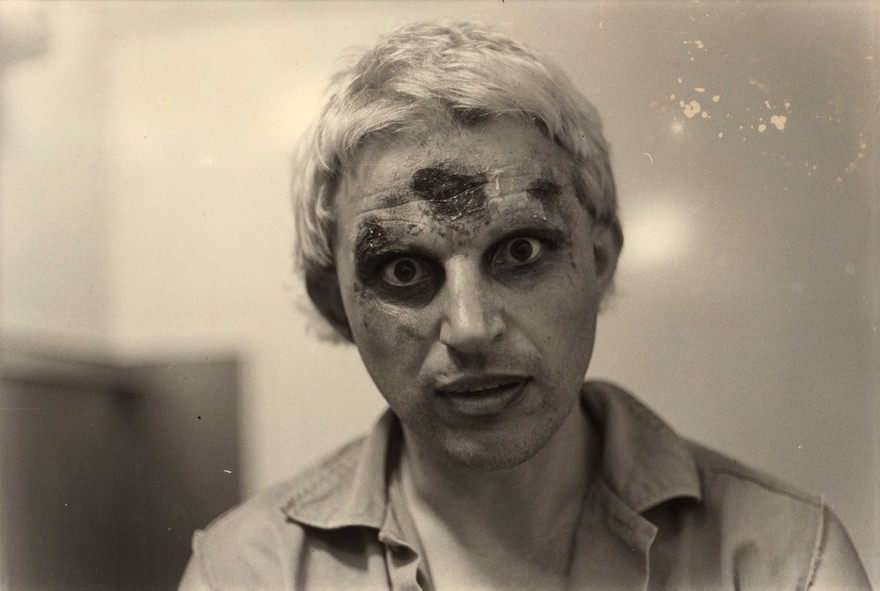 Contextual notes: A few weeks back I was having a pleasant conversation on Facebook when someone pretending to be Donna Maria Lawson played the troll, making cynical remarks and (for no apparent reason) reminding me that I’d once interviewed Chris Knox in his office in Cricketers Arms, a Wellington pub/music venue in the 1980s. ‘Donna’ claimed that I was nervous and intimidated by Knox, and that “the interview ended up being a competition for who could name the most obscure band”. I certainly had interviewed Knox in 1986, though I had never even gotten around to transcribing that interview, because shortly afterwards, I just ran out of time, with David Beatson rescuing me from the clutches of TVNZ Publicity (where I worked promoting Radio With Pictures, Ready To Roll, etc) to launch a new publication, RTR Countdown.
Contextual notes: A few weeks back I was having a pleasant conversation on Facebook when someone pretending to be Donna Maria Lawson played the troll, making cynical remarks and (for no apparent reason) reminding me that I’d once interviewed Chris Knox in his office in Cricketers Arms, a Wellington pub/music venue in the 1980s. ‘Donna’ claimed that I was nervous and intimidated by Knox, and that “the interview ended up being a competition for who could name the most obscure band”. I certainly had interviewed Knox in 1986, though I had never even gotten around to transcribing that interview, because shortly afterwards, I just ran out of time, with David Beatson rescuing me from the clutches of TVNZ Publicity (where I worked promoting Radio With Pictures, Ready To Roll, etc) to launch a new publication, RTR Countdown.
I have no recollection of interviewing Knox at the Cricketers Arms (I thought it had taken place at Knox’s abode in Grey Lynn), or of a Donna Maria Lawson being in attendance, though I’m willing to admit that I have less than a photographic memory.
‘Donna’ quickly got nasty, alluding to former Headless Chicken Grant Fell and his recent illness (in a kind of veiled threat) and ending with this overt threat: “Steel yourself for a nasty surprise, Gaz”. Naturally, I ‘unfriended’ and blocked this venomous nut.
Subsequently, Facebook friends informed me that the person using Donna Maria Lawson’s profile is actually the former booking agent/manager of the Cricketers Arms, and is well known for trolling and threatening behaviour. I won’t name and shame him, because it would be giving this sad person fame he doesn’t deserve. [If you’re reading this and you happen to be the real Donna Maria Lawson, however, please make sure someone you know isn’t covertly using your profile name].
So anyway, his claims about the 1986 Chris Knox interview got me thinking. I dug it up, and here it is for the first time ever. You’ll notice that “the competition for who could name the most obscure band” simply never took place. What is there however, is a rare insight into the machinations of the Flying Nun label in 1986, into Knox at that time, and the NZ music world itself in the mid-‘80s.
In a weird way, then, the Facebook troll did me a favour. Knox seldom gave bad interviews – if ever – and here he’s on form.
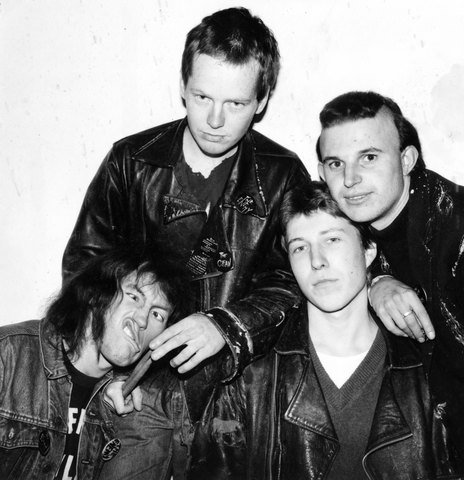
Gary – How about a brief potted history for those who don’t know.
Chris – Are you all sitting comfortably 12-year-olds? Um, born 1952 Invercargill, went to school for far too long, went to University for a year, got a bursary for the next year but stayed at home and learnt far more by doing so, reading books in bed and stuff like that. That brings us up to ’72. Worked, went to prison overnight for shoplifting records. Son Of Schmilsson, actually. It was a dare. We’d done every shop in Dunedin except for this one, thought we’d better do the last one. Formed the Enemy late ’77, brought the Enemy up to Auckland thinking it was the Holy Grail in 1978. Broke up the Enemy about the same time formed Toy Love 1979 played a lot an awful lot recorded some singles that were okay, went to Australia and recorded an album that was horrible, came back did a ghastly tour broke up half way through, finished the tour anyway, went our separate ways. A bit later formed Tall Dwarfs with Alec Bathgate guitarist from Toy Love put out five records, Alec went to England. Temporary hiatus in career. Meanwhile I’ve had two kids and a great relationship and with parents help bought a house started writing for The Listener late 1985 purely because Gordon Campbell seemed to think I ought to. And am getting fat bald and more children by the minute.
Gary – Great.
Chris – Is this on the record? I’ve got to ask that. I mean, this is a question that I presume isn’t on your sheet of questions, so… You’ve gotta be careful! Um…
Gary – Yep. Why do you bother doing records, if you think they’re inferior [to the live thing]?
Chris – The Tall Dwarfs is different because they’re organic as in the songs are written as they’re being recorded. So it’s not the same thing at all. Like lots of albums in the past are great albums that couldn’t possibly have been done live, like a lot of the Beatles stuff, a lot of Stevie Wonder’s output, stacks of stuff couldn’t survive live in the format that it’s been recorded, because it’s been recorded first. And most stuff that’s been recorded first works well that way, but if a band’s been playing stuff live a long time, putting them down on record is extremely difficult because of expectations of them being like the live performance, and that being the hardest thing to do in the studio. It’s a piece of piss to do a song that’s grown in the studio, it’s much more difficult to do a studio version of a live song.
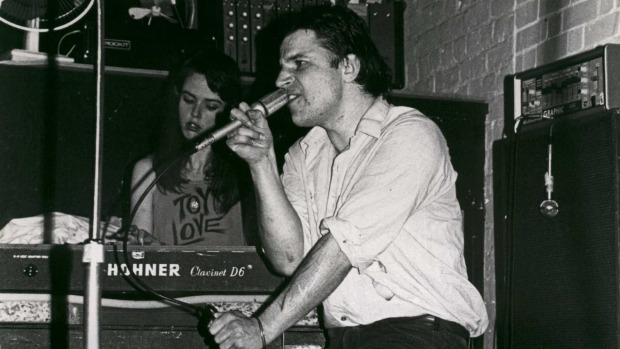
Gary – So in the Tall Dwarfs’ case a lot of the sounds you get in the studio are found sounds that you might play around with that aren’t reproducible on stage as such.
Chris – Yeah, to a degree. Sometimes on stage we use tape loops and very similar sounds. A lot of the Tall Dwarfs songs have rhythm tracks that go WHOOF-do-do-do-do-do-do-do, just like ‘In Turning Brown…’ That was just me in a microphone, which is pretty difficult to do onstage unless you use a backing tape, but I discovered if I put heaps of fuzz on it and play clusters of notes down the bottom I can get a sort of WHOOF-do-do-do-do-do-do-do, so some things are reasonably reproducible on stage.
Tall Dwarfs do things so quickly because we see each other so seldom – we’ve only ever got a week to do the whole record – that we just do things in a hell of a rush. The songs, the noises, the sounds, the arrangements all come together at approximately the same time, and it would be irreproducible even to try and record it the same way again. Because it happened so fast we forget as soon as we finish. Which is really good because it makes the records much more listenable to us. A bit more like your average listener, whereas you can spend hours, days in the studio doing one song going over things very clinically, you know exactly what you’ve done, and it’s not so much fun to listen to later.
Gary – So you think you’ve got some objectivity about it when you listen to it?
Chris – Sometimes, yes, certainly on Slugbucket and on the new tracks on the last record especially, they were done in chaos, and I can’t even remember who played on it. I think I’ve got it right on the little booklet that goes with it, but for one song I’m not absolutely sure, I didn’t have time to check up with Alec, him being in England, it was done in a blur, as was most of Slugbucket. It’s a good way to do it, keeps it fresh, raw.
Gary – So you think the result is better when you’ve got something that’s been done in such a short period of time.
Chris – Yeah, in a way, although I do believe that you can get good recordings of songs that you might have been playing for even five years. I don’t believe that’s impossible by any manner of means, and if it’s a good enough song and you do get a good recording of it, then that’s every bit as good as what we’re doing. As yet Tall Dwarfs haven’t recorded anything that was written before Alec and I coming together. ‘Nothing’s Going To Happen’ was an old riff that we came up with in the late Toy Love days, but that’s the only time I think that we’ve used anything that wasn’t… but I still think you can achieve wonderful things even in a 24 track studio with an old song that’s been flogged to death, if the song is good and it can still be played with conviction.
Gary – What’s the ongoing situation with Tall Dwarfs?
Chris – It’s ongoing. Alec should be back at the end of ’86, and I’d love to do a whole lot of recording with him. Would be really great to spend a whole month together. If we lived in the same city, at the rate we do things in a fortnight we could do about 200 songs a year without much trouble. You may well look scathingly, but there’s a woman who lives in the same house, about five yards away, looking very querulously, that’s because the woman tends to have to look after the children while I’m pouring out songs. (Laughs) So, maybe not 200 songs a year, not unless we got a nanny.
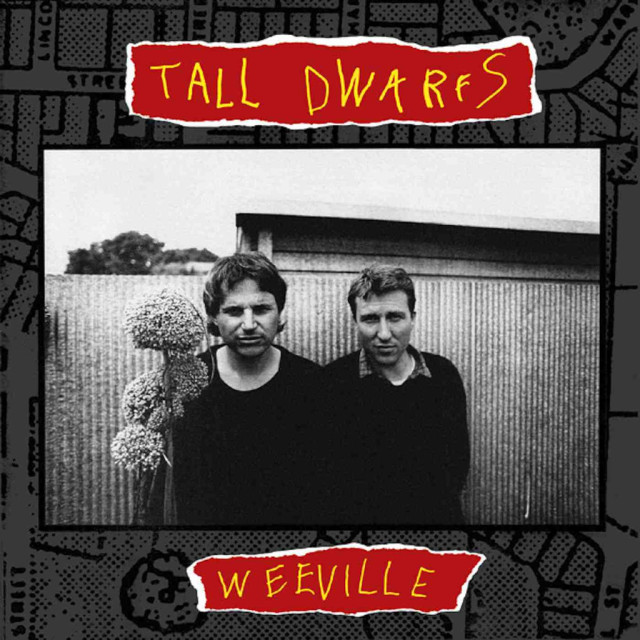
Gary – Do you find it frustrating at all that the stuff you do comes out about a year and a half after it’s recorded?
Chris – Oh it’s been coming out quicker recently. But that would be an annoyance if our music was catering to a contemporary audience, as such. Like if we heard the new Go West single and thought what a great sound, the kids are really enjoying that, let’s knock one up rather similar and get it out before the phase ends. Then it would be a problem, but our stuff is so classically timeless that it doesn’t really matter when it comes out. It generally comes out within a couple of months of being recorded these days, well, could if we didn’t take so long on the covers.
Gary – So it’s the covers that hold them up?
Chris – Can be. The last two covers have been quite complex, fun.
Gary – They’re pretty bizarre alright.
Chris – It’s good to have something to read. You’ve got 10 musical things on one side, which is a lot to slog through, but if you can read the lyrics and look at the drawings, I think it helps. I think if I was new to the band and came across 10 songs in one lump I’d find it difficult to get through if I didn’t have something else to do while it was playing.
Gary – What’s going to happen when they phase out records and compact discs are the only things?
Chris – Oh compact discs. (Exasperated sigh). In this day and age there is not going to be any one thing that will take over from vinyl, I don’t think, because by the time compact discs get cheap enough to become the norm there will be something better than compact discs. There are these crystals that are about the size of an egg cup that all the information that goes on a compact disc can be crammed into and much more, and have much greater fidelity again. Overseas, a lot of people are using videotape, rather than compact disc. Hunters & Collectors videotape all their performances, just sound-wise. Technology’s advancing so fast that I don’t think there’s going to be one norm, so for a prolonged time people are going to have to fall back on vinyl because it’s the only norm, purely because it’s been established so long. It’s just a shame that pressings are of such shoddy quality, and cutting techniques in New Zealand aren’t up to much either yet. But I think we’re stuck with vinyl and cassettes for awhile.
Gary – What’s happened to the Chris Knox recording method? The whole porta- studio approach of the early Flying Nun days.
Chris – That was always played up more by other people than by ourselves, really. The Sneaky Feelings had always been rearing to get into a 16 or 24 track, same with the Verlaines and lots of the other bands. Looking back most of them can see that what they achieved on 4-track had strengths that the stuff they’ve done in big studios lacks, but also, particularly with those two I mentioned, they’re using so many extra instruments and more complex backing vocals and stuff it is difficult to achieve on a 4-track. The Sneaky Feelings in particular have been going for a certain slickness that you just couldn’t do with a 4-track. But there are other… like in Auckland at the moment, people like Goblin Mix and Bird Nest Roys who have had rather bad experiences in large studios are beginning to re-evaluate how they want to do things. Bird Nest Roys are really pissed off with the record they’ve just done, the way it’s come out, and they would like to do something much liver and dirtier, but not necessarily on 4-track. You can do that quite simply in a 24 track or 16 track studio, as long as you’ve got a live room.
Most studios that go 24 track for some stupid reason insist on dampening and deadening everything so you get what they call a pure sound by putting a microphone very close to a speaker and having no other noise, or preferably by direct injection into the desk. Whereas most of the Flying Nun bands would suit being put through an amp and miked from a distance in a real live room with the sounds bouncing around all over the place like the sound you get at a good gig.
So it’s not the technology itself that’s frowned upon in early Flying Nun days – that you were doing it on 16 tracks or whatever – but HOW you do it. And at that stage all the big multi-track studios in New Zealand were insisting on doing it their way. Now that we’ve gone into those studios like Mascot and The Lab – 16 tracks both of them – we’ve learnt how to pervert them, and managed to find good engineers who will let us have our way and do things in a 4-track way. The obvious example it ‘Nothing’s Going To Happen’ on Short & Long and ‘Lying In State’ on The Verlaines album, which was done very live, and people are starting to come round to that again, which is very much in line with the Flying Nun philosophy as such.
It looks quite a long way from what people perceived as our aims and ideals at the beginning, but the basic thing is that Flying Nun lets the bands do what they want to do, gives them as much financial support as possible. If they want to go into a 24 track studio and are adamant about it we’ll try our damndest to record them in 24-track. Mostly, when they do that, they come up with their own money – Sneaky Feelings and The Chills have substantially come up with their own money. We’re not going to say you’re going to do it 16 track, fuck you. That would be really dumb.
Gary – What do you think of the quality of material that’s coming out of Flying Nun over the past year as opposed to the first year? Have the bands changed, has the music changed?
Chris – I was listening to Dunedin Double for the first time in ages on a crappy old mono machine just recently and was amazingly impressed by The Stones in- particular, what we’d done with them, and The Verlaines, to a lesser degree, but taking them as a case, what we did then has some real strengths in the songs, the performances and the recording that aren’t lacking in recent stuff, but they’re certainly different. Like the playing’s improved, Graeme’s voice has improved, the songs are more craftsman-like, the recordings are much better in terms of actually being able to hear everything, but overall I don’t think there’s much difference, really, when you take the good parts of the old stuff and compare them to the good parts of the new stuff. There’s not a hell of a qualitative difference, I don’t think. But I feel that a good performance of a good song is a damn sight more important than being able to hear every note that the bass player plays, which a lot of people now throw up their hands in horror about.
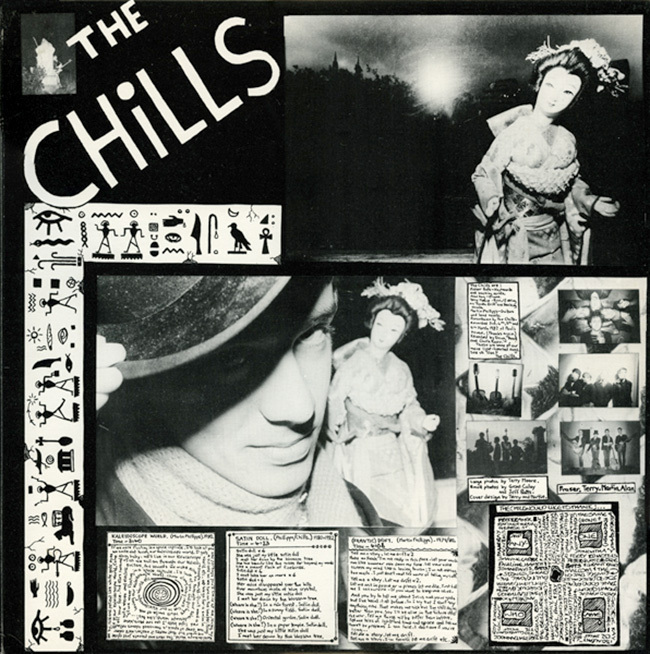 Gary – Tell us about the business side of Flying Nun.
Gary – Tell us about the business side of Flying Nun.
Chris – Well, Flying Nun is under a lot of pressure from various quarters to go big time. Like we’re getting offers from the States, Australia, Holland, England, all over the place for licensing deals and all that. And from this distance it’s really hard to figure out what to do. But our general consensus is that we’re going to try for people overseas with distribution networks that are on a par with ours. Which is very basic, but we’re still getting to people that other labels don’t get to – but in a fairly haphazard, shoddy fashion. We don’t want to go with multinational labels overseas if we can possibly help it. The most attractive offer we’ve had from England is from Rough Trade, and the most attractive offer from the States is from Big Time, and Australia Hot records which are very much on the same level we are, but they’re not really good enough, so we’re going to investigate things further there. As to New Zealand, Virgin has mooted the idea of distributing our records, but that was just a cause for much jocularity.
I don’t think there’ll be much of a change in the next few years really, I think as far as New Zealand’s concerned we’ve got as big as we really can manage. The only way if things could get any bigger is if cash flow got more flowing, so that people could actually be paid. I’ve only just started getting paid properly, I’m getting a hundred and fifty bucks for three full days work a week from Flying Nun now and I’ve been working for them for four years, the first three without any money, and we’re employing one other person in Christchurch who’s working a full week and getting paid a full wage, but that is all.
Gary – That’s Gary Cope?
Chris – Yeah, that’s right. So that’s only two people in New Zealand officially being employed and getting any money, all others just do it as a favour and so forth. So it’s going to take awhile before we can afford to get behind some reflective glass in Queen St. I think, I hope and pray!
Gary – You think they’re going to move up to Auckland eventually?
Chris – I doubt it, I very much doubt it. Because so much of the strength is in the South Island and so much of the musical quality is in the South Island. There’s going to be a whole bunch of stuff coming out of Dunedin and Christchurch this year that’s a whole new generation, the post-Chills/Verlaines/Sneaky Feelings. Apparently there’s some really good stuff, I’ve heard so little of it. I’m pretty out of touch with it. But people like the Puddle and The Orange and older more established bands like Wreck Small Speakers On Expensive Stereos. What we’ve got to do as a label is continue nurturing that sort of thing, so there’s always the possibility that some of our major acts will get lucrative offers that they’d be dumb to refuse. We’ve helped them to a certain level, and if they want to take it further than we’re equipped to handle, that’s fine. Our job is to make sure that bands that haven’t got to that stage have a chance to record.
Gary – So you see yourself as remaining on the fringes, as opposed to moving into the…
Chris – Well we’ve got no choice really. There was at one stage last year a move on Dance Exponents’ part to become a Flying Nun band, and there were certain factions within Flying Nun that thought it wouldn’t do us any harm. The faction that I was involved in thought it would do us considerable harm! And that was how it eventuated: no Dance Exponents on the label. And to have a band like the Dance Exponents, The Mockers, The Narcs, is the only way that you can get into that big New Zealand scene, because no matter how big a quota we have the radio is not going to play Goblin Mix, Abel Tasmans, Bird Nest Roys, The Weeds, The Bats or whatever, not because of the quality of the records, but because of politics, and I think Flying Nun has burnt all its bridges for being Flying Nun as long as it has, no matter what we do. Husband House for instance was marketed by the Sneaky Feelings manager in a very mainstream way and pushed on mainstream radio stations and it was perfectly playable but nobody played it. It’s too late for that, and I personally don’t want to be any part of the mainstream, because the mainstream has lost virtually all quality, all hope now has gone.
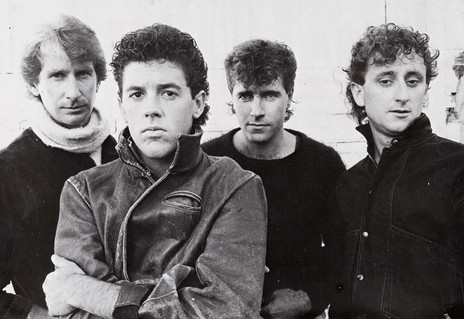
Gary – So you don’t think it’s worth infiltrating the system.
Chris – No! I think the only way you can do that is by compromising so much that you become a part of that system. We don’t want that, at all. We’re going to be a label that ignores the system as much as humanly possible.
Gary – It just seems crazy that some of the Flying Nun bands can sell as many records as the Netherworlds or whatever without the hype, that they’re not getting played. That they can’t be considered as potential – as you said you can imagine Sneaky Feelings played on the radio.
Chris – No matter how well it’s produced either, the sort of music is not playable. I can’t understand the radio’s attitude. They say we can’t play that because it sounds old fashioned or because of one thing or another. But constantly play golden oldies from the ‘60s that are so close in structure and sound and so forth to the Flying Nun stuff. It amazes me.
Gary – It surprises me that the stations in the early ‘70s would play such a wide range of stuff – stations like Hauraki. Every bit as radical as you’d hear on Flying Nun really. But now they go for that American glossy production sound.
Chris – I think it’s even simpler than going for a sound, they just go for the American top 40. My cousin works for 89FM, and summed it up in a nutshell the other day when she said radio’s got much more bland, but since it got so bland we’ve doubled our ratings, that’s what people want to hear. I don’t believe the last bit necessarily, but it’s obvious the more bland they become the bigger the ratings the more ads they sell, which is all they’re concerned about, that’s all that radio is now, except for student radio and the YC’s etc. That’s something that is comparatively new and can only get worse. So as far as we’re concerned fuck radio as well, student radio has been incredibly supportive, and hopefully we’ve given them an equal amount of support back, and hopefully they’ll get bigger and bigger before anybody can stop them. But they’re our only bloody hope as far as radio is concerned, and they’re doing a great job, and there’s an infinite amount of variety on student radio, more than anybody else. BFM started getting rigid with its playlists, but they’ve pulled back from that, when they started getting response from the audience… so they’ve pulled back from that position and got looser again, which is great.
Gary – Flying Nun has a much higher profile in NZ than practically any comparable label in England, for instance. Apart from The Smiths on Rough Trade and The Cocteaus on 4AD and a couple of other bands, no bands infiltrate that national top 20, whereas in NZ Flying Nun bands consistently get on the national top 50 or whatever. Isn’t it elitist of Flying Nun to say fuck the system, even though it’s popular enough to be popular with so much of the public?
Chris – No. I don’t think so. Accusations of elitism are pretty silly, because you can’t be elitist and be liked by that many people.
Gary – But what I’m saying is that fuck the system is an elitist attitude given that you obviously are a part of the system.
Chris – Okay, yeah, if you’re on the top 50 you’re part of the system, in the end, through no fault of your own, but at no time apart from the fact that our records have to be made and sold by the system, at no other time do we get in to that system, and it’s accidental that every now and again, through some horrid happenstance, we chart a record.
Gary – But you do want to sell as many records as you can?
Chris – Yeah, but not at the price of making records for a market that gets them almost automatically into the top 10. Not at the price of destroying bands by making them work in ways that aren’t conducive to having them come up with good music. Some of the bands involved in Flying Nun want to do that, do it and then realise what the hell’s going on and pull back. The Chills are in the process of getting close to destroyed by the way they’re gone about things, but I have lots of faith in the Chills and think they’ll survive.
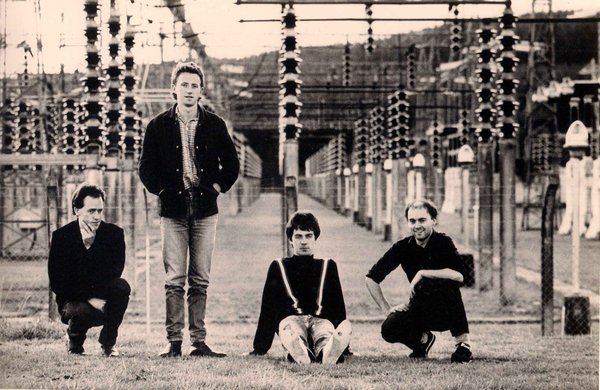
But as far as elitism is concerned, we give each band their head as much as possible. Bands stay with Flying Nun because they like the way we do things, not because of any credibility or desire to be part of an elite, it’s because they appreciate what we’re doing and they feel comfortable with it. There’s no contracts, no pressure. On the other hand we’re incredibly disorganized and find it difficult to get things out at the time we promised them to be out and so forth, but generally the bands feel that that’s of less importance than being happy with what they’re doing. And because they’re very much in control they can’t blame us if they don’t like their records, which is very nice.
Gary – Sorry to come back to elitism again, but do you think that Flying Nun has the potential to be a monopoly in NZ? Obviously, the A&R people at Flying Nun, the music that’s chosen to be released, might fit within a certain area that deletes certain valid music from release, and then they have to go do it by themselves or go to Jayrem or something.
Chris – Yeah, but we can only put out so many a year and it’s stupid to put out music that we don’t personally like, even though we might appreciate how good it is at some level, at the expense of stuff we do like. That’s what Mike Alexander did with Bunk, and that’s just an abrogation of responsibility. He’s saying I’ll put out a record, I don’t care what it’s like, I’m not to judge, if they believe in it they can put it out. Which is sort of okay and Jim Moss has got a more restrained version of that philosophy, but we just can’t afford to do that.
We get approached by all sorts of people. I just had a guy come round with two songs that were done a couple of years ago that are just straightforward electric blues, extremely straightforward with execrable lyrics. It’s put together nicely, but we’re not going to release it. If we released everything that was given to us of some quality – which there’s a lot of – we’d have about 400 records. Someone else has got to do it as well, and Jim Moss is doing it, bloody good job, it gets people off our backs from Wellington and so forth. Ode’s doing a really good job keeping the folkies away. I wouldn’t mind some of the action the Web Collective and people like them have been getting.
But we just basically put out stuff that we like. I don’t think there’s a Flying Nun sound. If you listen to Tuatara the compilation the difference between Fetus Productions The Gordons and The Bats is pretty extreme. Marie & The Atom, Tall Dwarfs – I think that each thing is quite individual, and that the Flying Nun sound is something people who have only listened to Clean records and the Flying Nun Double have manufactured to make things easier to classify.
Gary – Would you comment on the way the local multinationals promote NZ music – ie, bands like Peking Man and so forth.
Chris – I personally don’t like them a lot, but that is what those bands want, and very much what they’re getting, those labels are doing an exceptional job of attaining the goals of those sorts of artists. I don’t really care. I loathe most of the stuff that happens, and I loathe the compromises that have to be made, but the bands don’t seem to.
Netherworld Dancing Toys being a perfect example. The drummer and the bass player don’t seem to mind that they play on any of the tracks, they still dance around on the video, that’s the main thing. Um, that they have to ditch members of the band and bring in professionals to do half of it. On For Today there’s only two Netherworlds playing, and the bit that everybody likes is Anne Crummer’s, but they got a number 1 single out of it, even though it didn’t sell as many copies in 1985 as The Chills Lost EP. And that is a fact. They got what they wanted out of it. They got their number one single. That’s why Flying Nun wasn’t sad to relinquish the Netherworld Dancing Toys because their aims were not attainable by us. Their clip For Today was shown 9 times on TV NZ because of Virgin push basically, and fine, it got them off our backs. Yeah it doesn’t worry me, I don’t like what they’re doing, but it’s better that New Zealand stuff is popular than overseas stuff. At least it keeps the major studios busy.
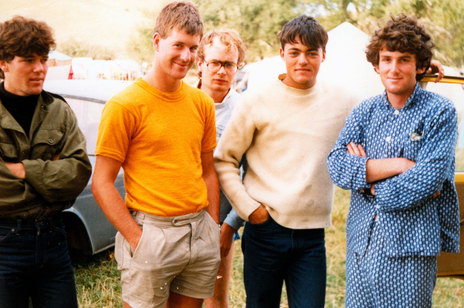
Gary – What about your own music. What’s your appraisal of your own output? In your head has there been any major shifts of why you’re doing it, how you’re doing it, what you’re trying to achieve?
Chris – No. Everything we do is to all intents and purposes exactly the same as the day I first got the 4-track and still didn’t know how to use it. And in fact we recorded the first record in a fashion that is totally wrong, but it worked really well. And we still try to do things wrong, because they tend to be more interesting when you do things wrong.
Tall Dwarfs was brought together as a reaction to what happened to Toy Love, which was destroyed by bigness, basically, and I’m still reacting against that, Alec’s still reacting against that. Sure we’ve done two songs in a 16-track studio, but that’s because it’s impossible to get 20 acoustic guitars onto a 4-track, and it was great fun, for a day, and we’re startled that we finished it, I couldn’t believe it went as well as it did, it was really good fun. My attitude hasn’t changed one iota, I don’t think, and the way we record things definitely hasn’t, everything done in a panic, and heaps of mistakes, and I don’t see that we’d ever do it any other way. Sure we’ll go into big studios every now and again. I personally want to do a song with a cello quintet, and heaps and heaps, about 16 vocals, just my own, and you can’t do that on a 4-track, but it’ll only be the recording fashion that will be different, the attitude and the way it’s promoted will be the same.
Gary – What do you think is the best thing you’ve done?
Chris – ‘Luck Or Loveliness’ and ‘Crush’, probably. The original version of ‘Clover’, before I erased the first 30 seconds. I like most of the Tall Dwarfs stuff actually. Some of it could be better, but some is pretty close to perfect, which might sound strange to people who think it sounds like demos for real songs, but I’m very pleased with most of it.
G – Has it got less pop in purpose?
Chris – Has it got less pop? Um, since Tall Dwarfs the songs have all been written really quick, and it’s much quicker to write a song that hasn’t got a chorus or a middle-eight, than to try and structure things like the Beatles done it, trying to write songs properly. But I think there have been some Tall Dwarfs melodies that have been as poppy if not more poppy than anything Toy Love did, it’s just that the backing tracks make them sound less poppy by their idiosyncratic approach to sound.
Like the Headless Chickens, this new band, they’re doing almost the same as we’re doing really, they’re using lots of jagged, discordant noise, and putting these cute little melodies over the top, gorgeous. They haven’t got a drummer. Sometimes they sound like Beefheart, Eno, Wire, Skeptics, Holy Modal Rounders. They’re great, you’ll like them I think.
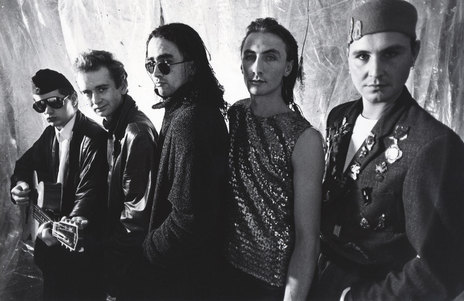
Gary – Do Tall Dwarfs sell a lot of copies?
Chris – I’m owed 6 gees in royalties at the moment, from Flying Nun, so… yeah. We now expect any new Tall Dwarfs record to sell at least 2000, which is rather different from the early days when… a lot of those who bought the first record bought it because of Toy Love, and a lot of those were disappointed. Now we’ve got our own audience. ‘Brain That Wouldn’t Die’ was top of the student top 10 for months, and Short & Long Of It sold well. Rough Trade in England have been selling quite a lot of it too.
Gary – In your different roles, is making music the thing that you find most gratifying?
Chrios – Yes and no. Definitely a million times more gratifying than writing a column for The Listener, it’s a damn sight more gratifying than hulking boxes of records around Queen St. On the other hand it’s about equally as gratifying as doing some good graphics. Like doing record covers is almost as much fun as doing the actual records, but things like – this is going to sound really corny – family and friends are even more important than music.
Um, as far as what I’m being seen to be doing, the stuff that comes from deepest is the music, sure. I’m really pleased to be associated with Flying Nun, because of what Flying Nun is, even though I get pissed off doing the job and I’m not very good at the job, I’ve got no head for business and basically a lazy person, I would find it difficult to hand it over to anybody else up here, because it’s become a part of the way I live I guess. But yeah the music is pretty important, as long as it’s done without having to change it because of market needs or whatever. If for some reason that I couldn’t predict or contemplate that went I’d give up on doing it and just play to family and friends.
Gary – So it’s basically the creative thing on any level, apart from family.
Chris – That’s being creative, bringing up kids brings out the creativity. It’s much the same as putting a good record together – you’ve got to have a lot of creativity and a lot of patience. Working with kids is quite good training for a lot of other things.
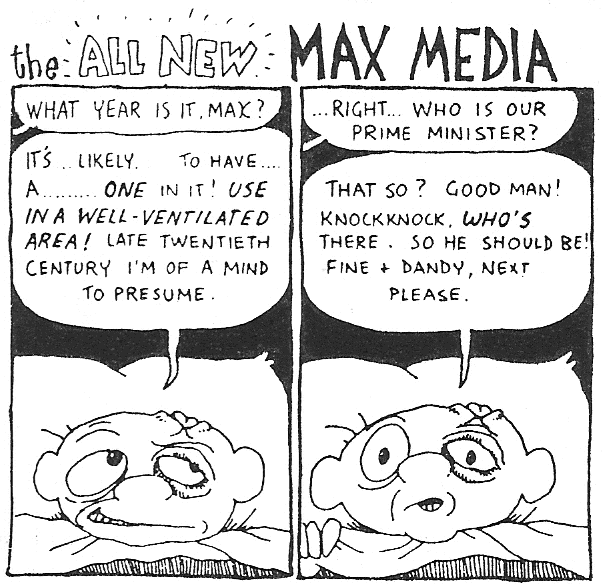
Gary – Does one feed off the other though? Do the frustrations of bringing up kids feed off into the creativity?
Chris – No, the only impact on the way we do music is, even when Alec is here for a fortnight, it means Barbara has the kids for a fortnight, and I feel incredibly guilty and try to get things done really quickly, so it rushes things but apart from that I’ve learnt a lot from Barbara, and I’ve had to progressively look after the kids more and more, find out more about the kids, and I’ve learnt a lot more about women, which is starting to come out in the music, lyrically. I’d like to do a kids record at some stage, I’m going to do a kids book. And the kids have been slightly involved in records in the past, either screams in the background or song titles. As the children grow older I’d like to involve them more, but at four and two they’re too young to use much, but they will start cropping up with more and more regularity I think, more on my stuff than Tall Dwarfs, because Alec is pretty much an equal, even though he may appear not to be in the way Tall Dwarfs are perceived, but he is very much a half of Tall Dwarfs so I can’t outweigh his influence by bringing in hordes of relatives and stuff.
I would like to make a point before we go any further that the difference between something like Songs For Cleaning Guppies is few of you have heard it and Tall Dwarfs is Alec’s influence, so take of that what you will.
Gary – How about [comic strip] The Critic, is that part of Chris Knox merely a financial part, just earning a dollar, or is there some part that wants to observe and comment on it.
Chris – At the end of last year, I was going to ditch The Listener because I just wasn’t enjoying it. I don’t like listening to records to write about them, it’s too bloody difficult. You may have noticed in my columns that I don’t dwell on lyrics much, it takes me a lot of listening to even start listening to lyrics, I start listening to the sounds and the sound of words, and when I first started coming after Gordon Campbell who looks at things to quite a degree from a lyrical point of view and is really good at it, a very incisive commentator on music, I thought I should be doing that and I was getting all clenched up and thinking I’m not doing it properly, and thinking why doesn’t everybody have lyric sheets, etc. And by the end of the year I was getting really depressed about it, but then the good old Labour government takes the sales tax off records and now I can actually write about stuff that I want to write about that is actually inaccessible. Up to now I wanted to write about imports but they were so hard to get that it wasn’t really worthwhile. Now I can with an easy conscience, so that will make things a lot easier, and also I can get away with so much at The Listener without them jumping on my back, that I’m going to get looser and looser, and less and less analytical, ignore the letters I get from intellectual people in Wellington, and just have a good time.
One of the main reasons I do it is to do the illustrations, because I would much rather… The Listener has approached me a couple of times saying “do you want to interview Dire Straits” or something, and I said no thank you, I don’t want to do that, but if they said do you want to do a drawing of Dire Straits, it would be yeah-yeah, because I would much rather be illustrating. But if I’m going to be writing I’ll stretch it until I’m just on the legible side of the famous Warren Lasky. The Listener delivers $97.50 per fortnight, so it’s not something I’m relying on to live.
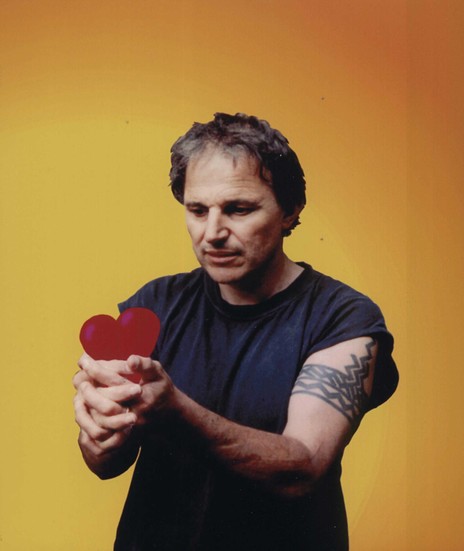 Gary – What did you think of [Ken] Double’s effort [in The Listener]?
Gary – What did you think of [Ken] Double’s effort [in The Listener]?
Chris – I only read it through quickly, once, because I don’t particularly like that sort of writing. I don’t remember much about the content I’m afraid. All I remember is Alex Fry got a letter from him rubbishing me and Fiona Ray. What points did he make?
Gary – It was his reaction against the student radio preference for English music, I guess. To me it was saying forget about the English bands, they’re just about the last book they read, here’s the new wave of America, it’s full of soul. Personally I thought it was a bunch of shit, but I was interested because you show a preference for English bands in general, from what I can gather, apart from the Velvets and so forth.
Chris – I’d challenge that, I listen to so little of the output from either country, because not much English or American stuff gets here. But I used to prize English music far above American in the immediate post punk years when there were stacks of bands around like Wire and Mekons and the Swell Maps, all those sort of people, and the most radical stuff that seemed to be coming out of the States was the Dead Kennedys. But I do think that it’s much more balanced now. But I aim to find out more about that. I’m going increasingly off English bands, especially those that are anywhere close to the mainstream. Hearing Microdisney was a very deflating experience. But the English stuff I’m enjoying at the moment is mostly… Jesus & Mary Chain I really enjoy, predictably enough, and the American stuff I enjoy is mostly along similar lines… noisy pop, lots of sound that bleeds all over the place and sets up dynamics and harmonics that you can’t get by putting things down one track at a time very cleanly. It’s noise to the uncultured, untutored ear, but to a discerning ear it’s a joyous sound, and putting lovely poppy melodies over the top seems to me pretty well the perfect way of making pop music, and I think there’s probably an equal number of people doing it in the States and England. It’s sort of the Ramones approach I guess, but taking it to its logical extreme, which gets you right back to the Velvets.
Gary – The local stuff – you don’t dwell on the local stuff due to you feeling a lack of objectivity.
Chris – My role is international stuff basically, Fiona does local stuff. I wouldn’t do it. I’ve been offered spots where I would have to do local music, like Metro, but I just couldn’t do it, because the stuff I like most is Flying Nun, and I can’t write about Flying Nun, and if I avoided Flying Nun, then I wouldn’t be able to write about anything.
 Gary – Is New Zealand media doing its job well in terms of music?
Gary – Is New Zealand media doing its job well in terms of music?
Chris – I don’t really think it could do it much better. Rip It Up has to do a lot of things that I would rather not see it do in order to retain advertising to retain its existence. Garage coming out of Dunedin does a much better job of New Zealand music although it’s heavily Flying Nun, but it gets into things much better. Local newspapers vary enormously, there are people who are supportive of all New Zealand stuff, the only thing with some of them is that they’re too eager to please in a way, some people obviously review records and are much kinder on New Zealand stuff than they are on overseas stuff which is a bit of a shame in the long run.
I think we’re quite lucky in New Zealand, like you were saying earlier about Flying Nun being in a position that no alternative record company in England is in. It’s much the same with the newspapers. I’m sure that the average Manchester newspaper doesn’t write about independent Manchester labels as much as New Zealand newspapers write about New Zealand labels. So I think we’re reasonably lucky as far as that’s concerned… The sound in the background is John plus an onion… Luckily most newspapers don’t take much notice of their rock columns, so writers can get away with quite a lot. Like the stuff that David Cohen has got away with in the NZ Times is pretty amazing.
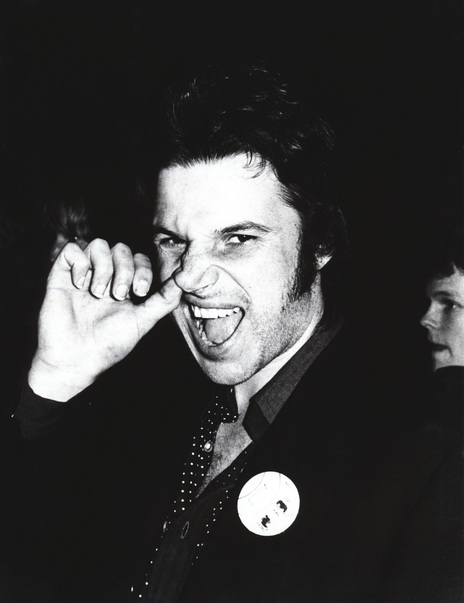 Gary – Do you think it’s a positive thing if they think a NZ record is crap that they say it’s crap?
Gary – Do you think it’s a positive thing if they think a NZ record is crap that they say it’s crap?
Chris – I think it’s a critic’s duty to reflect what a critic thinks. If you don’t there’s no point in doing the job. Like Rob White in Christchurch is great, if he doesn’t like something he’ll really rubbish it, and he often hasn’t liked Tall Dwarfs, but he rubbishes it in such a way that people who are familiar with his writing will know exactly what the record’s like, so that people who know that their taste is in variance with his will go out and buy it. David Cohen has no scruples about rubbishing New Zealand stuff. And that’s great. It’s good that people are supportive, but I think the support comes from noticing the records rather than praising them. Praise is great if it’s meant, it’s meaningless if it’s not meant. Don’t lie, lying’s horrible.
* Gary Steel’s bio on Chris Knox on AudioCulture is here.



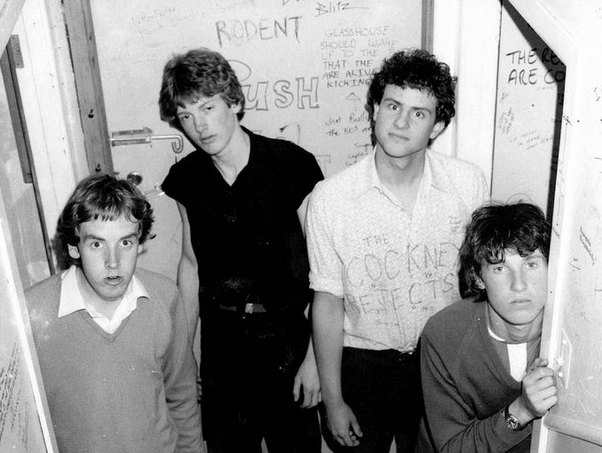
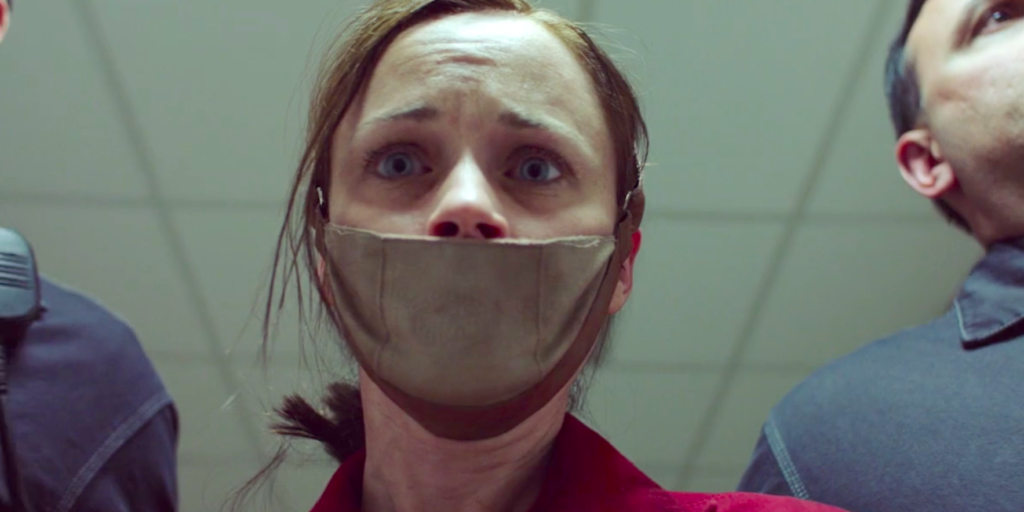

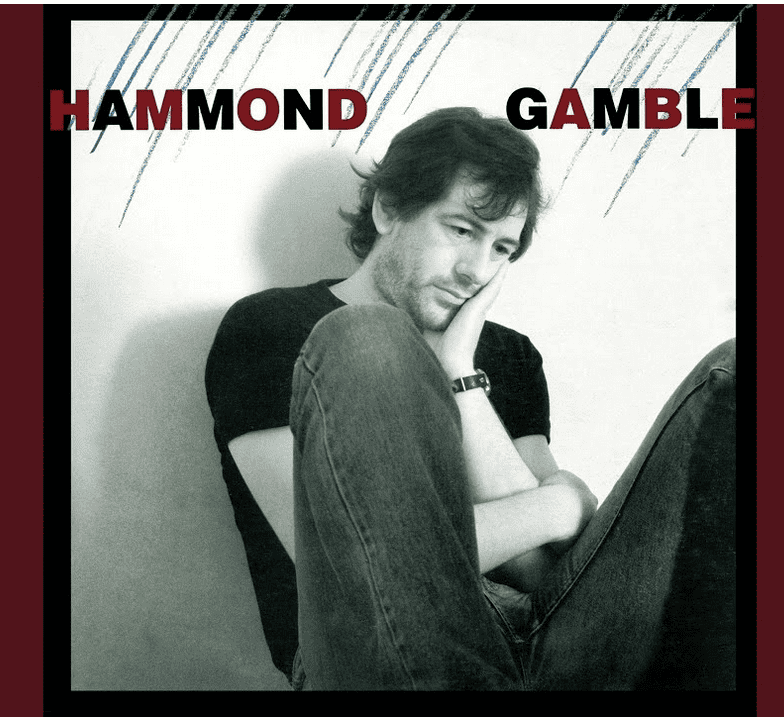
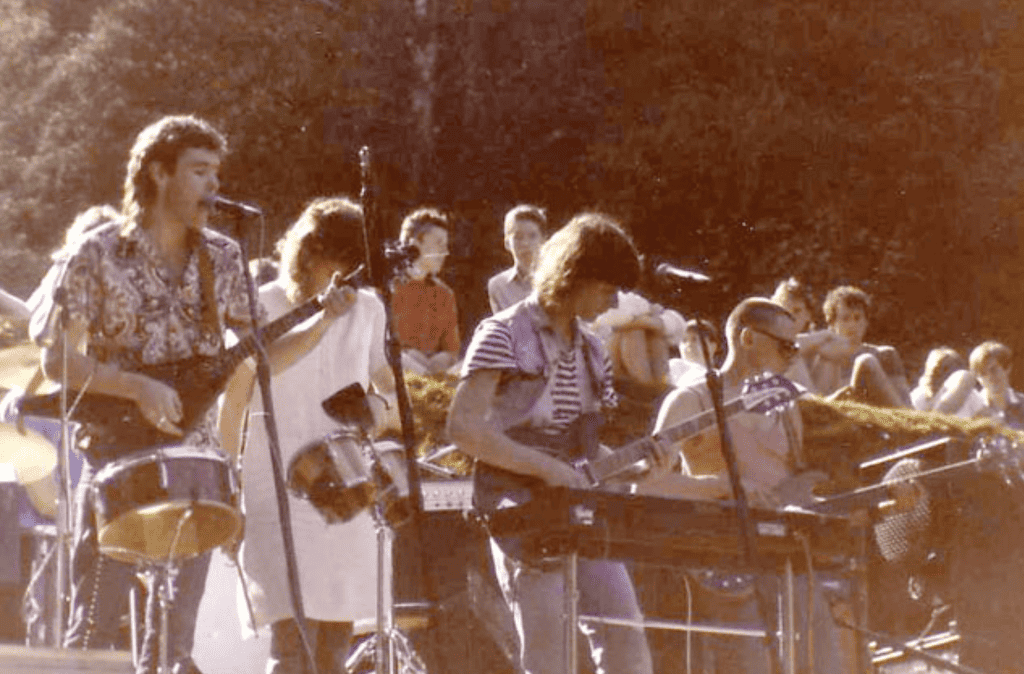
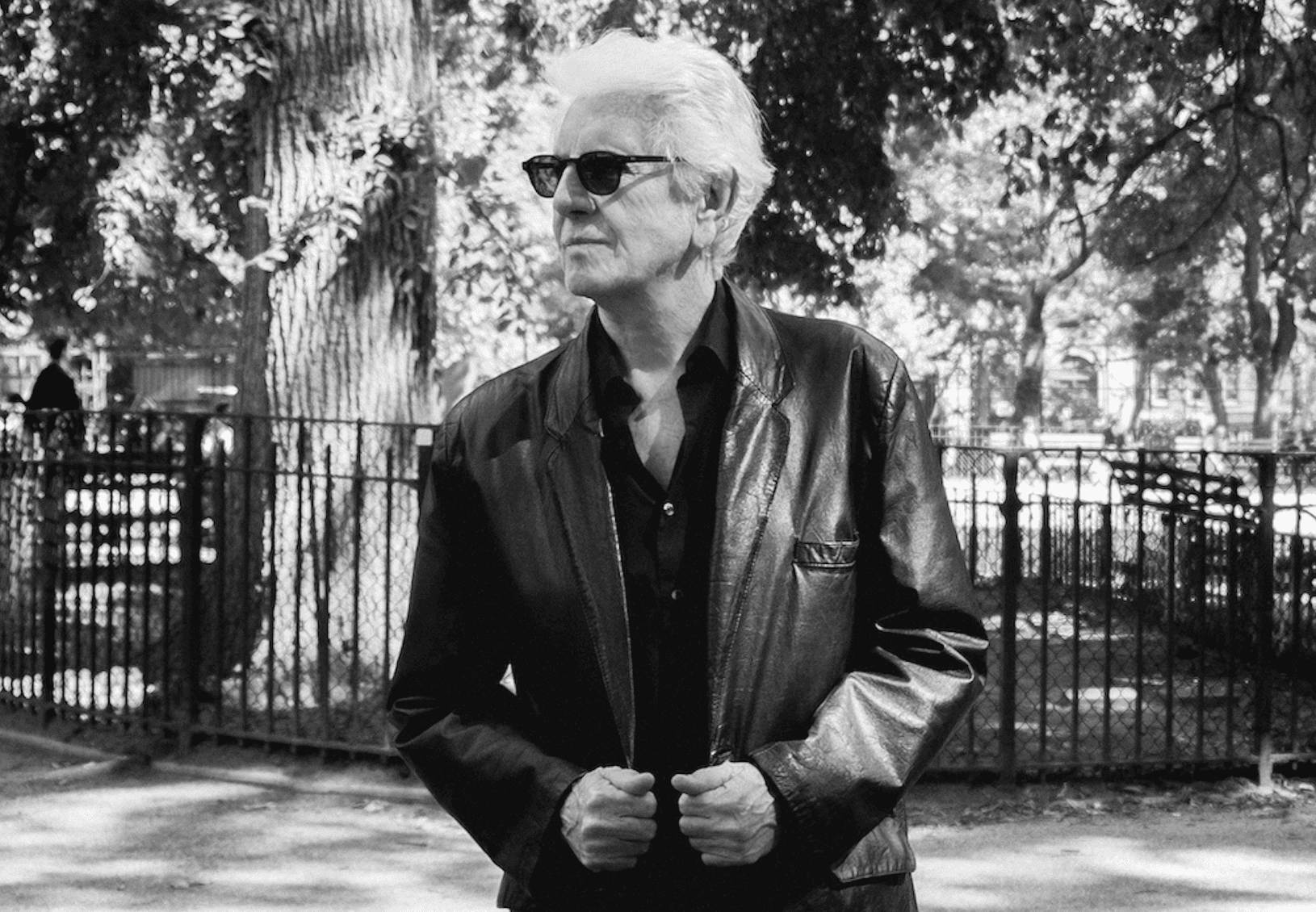
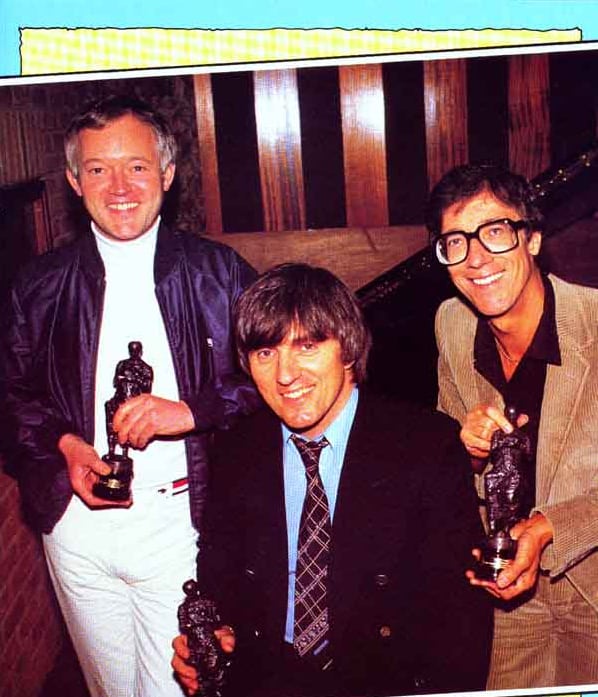

Tall Dwarfs rock !